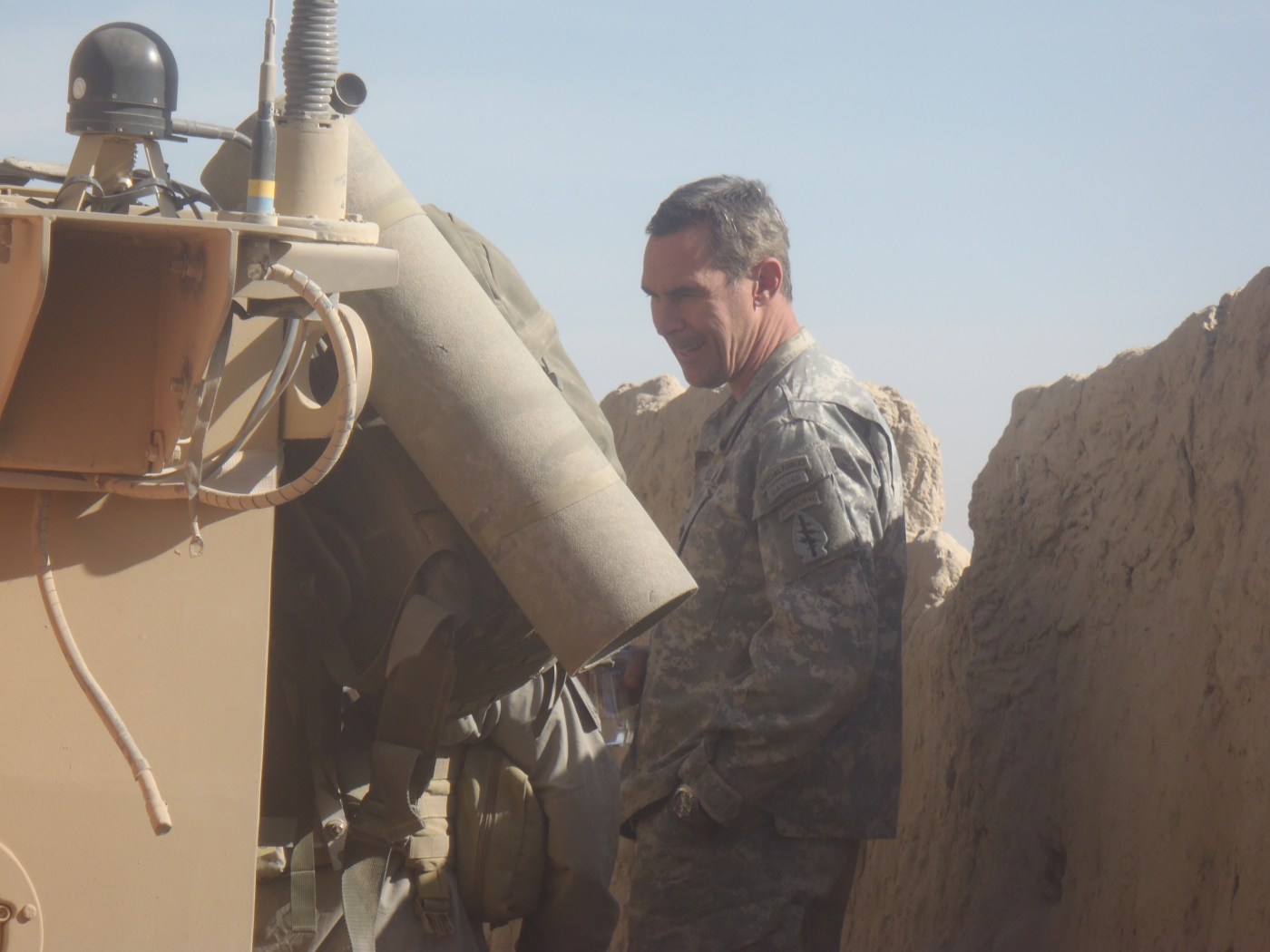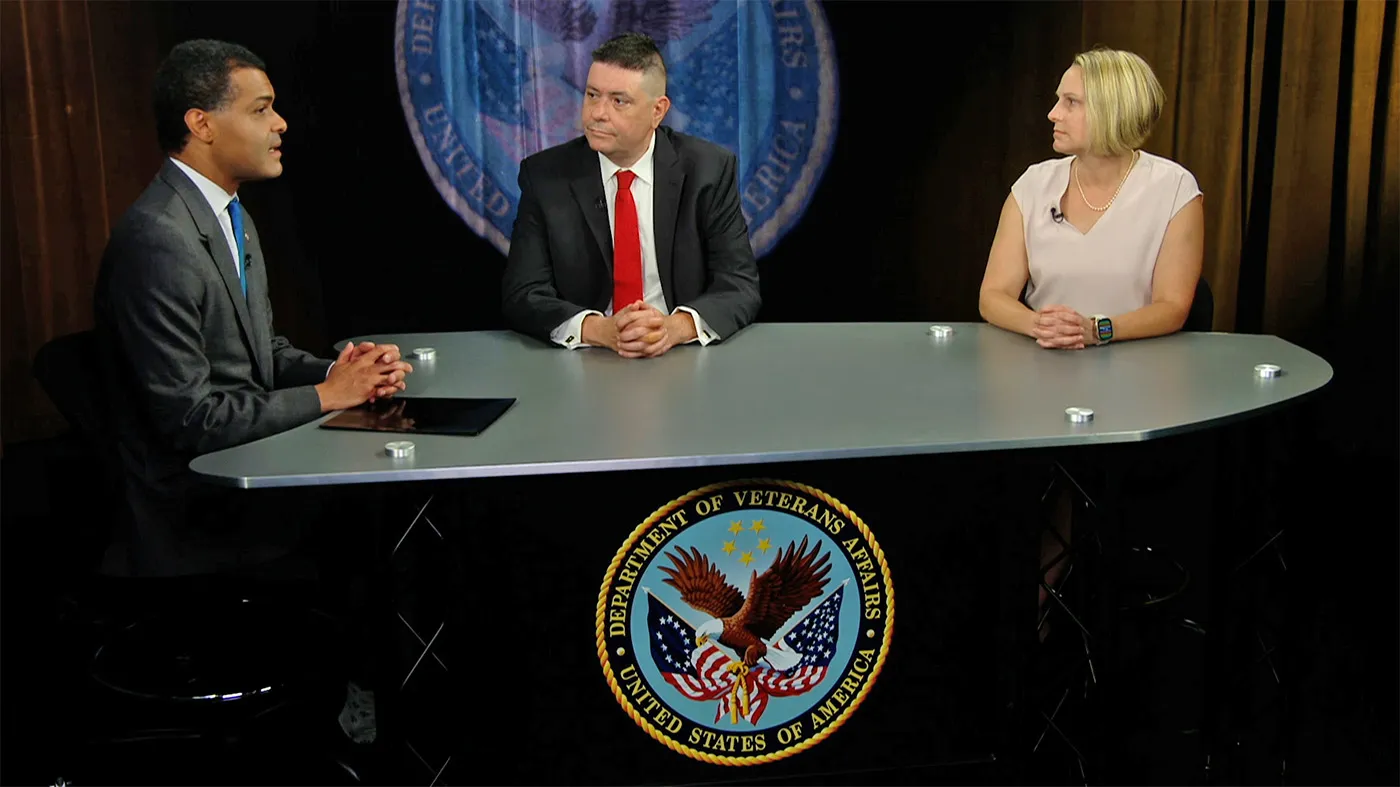Chris Riga knew something wasn’t right.
While standing for a few minutes at a ceremony in Afghanistan in 2005, the Army Ranger suddenly felt like he was losing his balance. “It almost felt like I had vertigo or something like that,” he says. “I was unstable and had to lean on something.”
Riga was exposed to a series of roadside blasts while serving in Afghanistan and Iraq from 2001 to 2014. Doctors didn’t diagnose his brain trauma until leaving the service. But just being in the vicinity of explosions has left him with challenges today. In addition to an unsteady gait that causes an occasional loss of balance, he experiences short-term memory loss.
“When I get that vertigo-like feeling, I’ll usually hold onto or lean on something,” says Riga, who is 55 years old. “The short-term memory issues are easily solved by writing things down or taking notes. I’ve always used stickies as reminders. I keep them all over my desk and put them in my wallet and pockets. One of the greatest inventions is the smart phone. You can set alerts on the phone as reminders.”
Long-term impact of TBI
Struggles with balance and memory are potential symptoms of mild traumatic brain injury (mild TBI), the focus of the VA program in which Riga is enrolled: The Translational Research Center for TBI and Stress Disorders (TRACTS). The initiative aims to understand the long-term impact of TBI. TBI is the signature injury from the conflicts in Iraq and Afghanistan, on the physical and mental health of post-9/11 Veterans. Improved medical care has enabled many troops to survive with brain injuries, hence the urgent need for advancements in research efforts and treatment options.
Most TBI injuries are considered mild. Even mild TBI, also known as a concussion, can involve headaches and long-term effects. Those effects can hamper thinking ability, sleep, mood, focus, balance, and memory.
TRACTS, based at the VA Boston Healthcare System, is carrying out one of the most comprehensive VA studies on blast injuries on post-9/11 Veterans. Since the program was launched more than a decade ago, about 850 Veterans have participated in its flagship project: a prospective long-term cohort study that includes an assessment of psychological and brain trauma. Of the 850 Vets who have completed the assessment once, nearly 500 have returned for a second time and close to 70 a third time, helping researchers learn if the participants have experienced changes in brain structure and function as they age.
`Accelerated cognitive aging’
“It’s very special that we’ve had so many people return,” says Dr. Regina McGlinchey, the director of TRACTS. “We conduct this as an aging study. The benefit of having longitudinal data is that we can look at a person’s trajectory across his or her life span, as opposed to doing group analyses where you compare one big group of people to another. Our approach is very different and much more powerful.
“TBI is a risk factor for Alzheimer’s disease and other types of dementia. The impact doesn’t have to be that drastic to affect a person’s life,” McGlinchey adds. “We can see declines in other cognitive functions in young people, such as memory, that we wouldn’t ordinarily see until someone is much older. We call this accelerated cognitive aging.”
More than 100 papers
Data from the TRACTS cohort study are the basis for more than 100 published papers. Those papers explore the impact of TBI and other conditions, such as PTSD, depression and substance abuse.
Chris Riga is thrilled to be a part of an initiative that helps Veterans find solutions to their brain injuries.
“What a great program this is,” he says. “There are very few programs doing the same type of research. It’s phenomenal that many Vets turn out to do it mainly to help others. It’s more so to help other Veterans in the future, while tracking your own progress as time goes on. One of the best things about it is you’ve got great folks doing phenomenal research. There are a lot of ways to mitigate the problem over time. This program will help with that.”
To read more about this project, visit VA Research Currents.
To learn more about VA research in traumatic brain injury (TBI), visit the topic page section of the VA Research website.
Topics in this story
More Stories
Diverse representation of women in health care research allows MVP to make discoveries for women’s health
Join the Million Veteran Program online. You will have the option to receive an at-home blood sample collection kit in the mail.
VHA's new podcast series, New Horizons in Health, features a candid discussion of psychedelic assisted therapies for Veterans experiencing mental health conditions.







Wally and the staff that do this research are wonderful! I’m one of the three time studied brains. I know my memory is getting worse and worse and just hope a future generation can benefit from our lessons learned to be better prepared and protected.
“If” the VA is serious about “breakthroughs on traumatic brain injury” look no further than “Sensory Deprivation” !!!
During an “Induced” state of Sensory Deprivation, the Brain enters a state of “Rest”… During this “Induced” state of Sensory Deprivation, the Brain is at its greatest state of “Rest” because of a lack of external data… Also, During this “Induced” state of Sensory Deprivation, the Brain is also at its greatest state of “Awareness”.
So, (theoretically) the “uninjured” areas of the Traumatically Injured Brain should become “Focused” on the injury site.
This might give a greater possibility of better long term outcomes for Patients. And, as a Caveat, The costs associated with these technologies would be far, far less than current therapies… Just one thing to possibly consider.
Respectfully Submitted,
Richard Edward Peters, Jr.
“Genius@Large”!!!
I am a 54 year old veteran. I have had the same exact symptoms as Ariga. I was injured when a first stage of a Pershing missile blew up. I was approximately 10 feet from it. I was literally blown up in the air. I landed approximately 30 feet away. This happened in 1985.
Doctors at the VA in Seattle have denied that I have or ever had a tbi. I even went outside the VA and paid a neurologist myself. He did a battery of tests. One of the tests showed that an injury to my head had occurred. I gave that report to my neurologist at VA in Seattle. She told me that because the VA didn’t do the certain kind of test they could not use the documentation I had given them.
I could go on but there is no point. I know many other veterans with the same type of story.
I type this to ask if there is any programs in the Washington state area like the one Ariga is attending? If so, how does someone get involved?